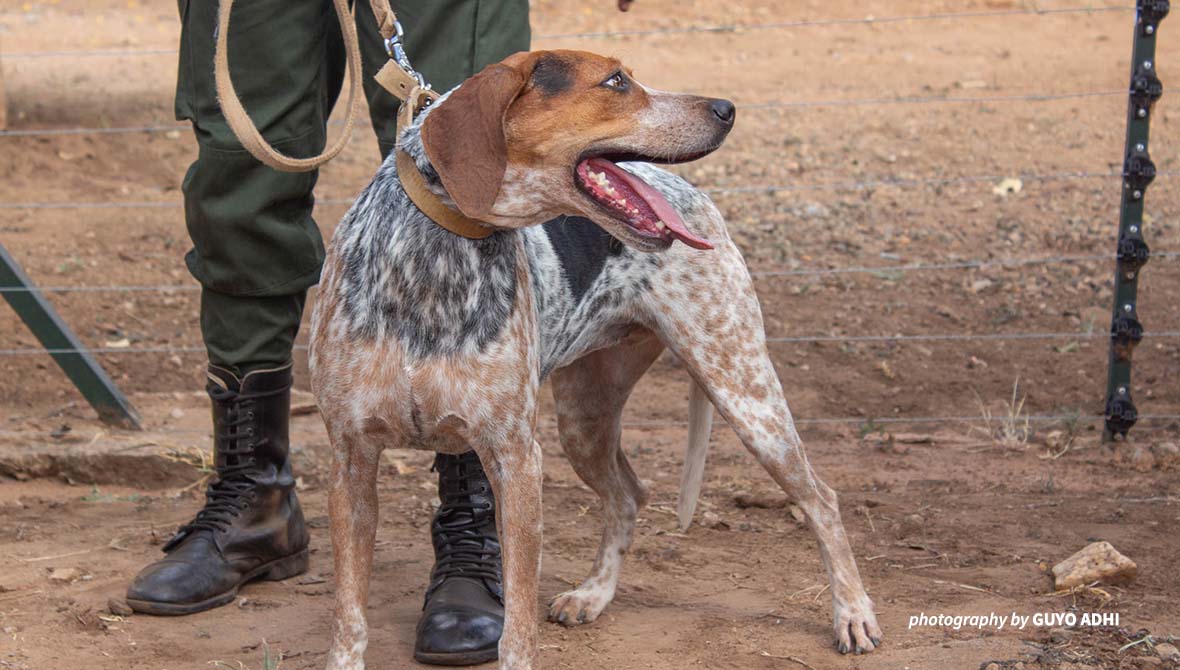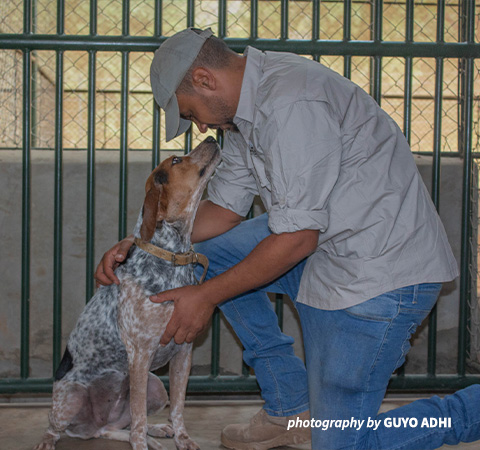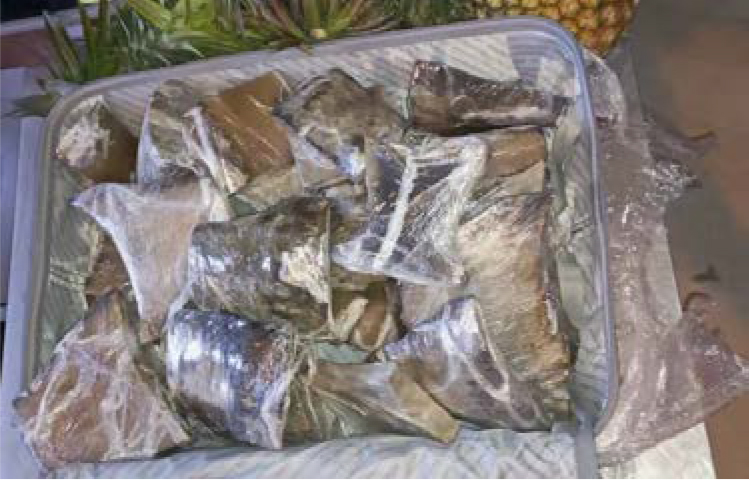International Dog Day: Celebrating conservation detection and tracker dogs

International Dog Day allows us to honor our trusted canines, whether they are beloved pets or endangered wildlife like the African wild dog. This year, African Wildlife Foundation celebrates the work of our specialized trained sniffer dogs and tracker dogs primed to detect illegal wildlife products, as well as the challenging work their handlers do as the hand that guides a canine’s nose.
As we continue to work with wildlife management authorities in various countries to train and deploy dog-and-handler teams at targeted ports and borders, learn why these conservation canines are critical in the fight against illegal wildlife trade in Africa and what makes our Canines for Conservation program unique.
The Unique Human Bond with Canines
Dogs have a special superpower that humans lack which, if we tap its potential, can be critical in conserving wildlife. A canine’s nose can be up to 100,000 times as powerful as a human’s, but it takes training and a special relationship between a handler and man’s best friend to protect wildlife.
At AWF’s Canines for Conservation Training Centre in Usa River, Tanzania, the dogs learn the unique scents attributed to wildlife contraband that only their sharp olfactory sense can catch. In a matter of seconds, the trained sniffer dog can pick up a whiff of the wildlife product – in practice, they have to find these among a plethora of other scents – and relay a quick response to their handler. While the sniffer dog gets a reward for the quick work, the teams come away with evidence to prosecute wildlife offenders.
Tracker dogs have a different training goal. Canines that will one day patrol poaching hotspots and investigating crimes on the ground first have to get accustomed to follow sets of tracks for a long period of time. Trainers increase the distance and duration of tracking until the dogs can follow the same tracks for days. It takes patience and determination from their dedicated handlers for this training to pay off. The canines that excel at this are destined to become extremely efficient trackers – and effective deterrents for poachers.

This training is not just about honing canines’ skills at tracking and smelling. They also learn how to work with humans, as they can only succeed thanks to the strength of their bond with their handlers. In fact, this bond is the foundation for the rest of training, and it must be established first. Handlers are deeply dedicated to their work and helping their canines thrive.
Their handlers are usually rangers from wildlife authorities, and their special skillset is the key to the operation. Without their guiding hand and dedication to searching for wildlife products or long days tracking in the field, this program could never get the results it achieves.
“The relationship between the dog and his or her handler is one of the most important factors in the success of any program like this,” said Will Powell, Director of Canines for Conservation, in a previous interview. “If the dog and handler don’t trust, respect, and love one another, the partnership breaks down.”
Deployment across key transit routes in Africa
After their rigorous training in Usa River, the canine teams are deployed to locations with historically high rates of trafficking and poaching to catch and deter wildlife product smuggling. Since 2014, we have deployed detection teams to at key trafficking points in Kenya, Uganda, Tanzania, Mozambique, and Botswana. Between June 2021 and June 2022, these units cumulatively searched 12,794 flights, over five million cargo shipments, and over 52 million pieces of luggage.
At the same time, AWF is working to expand into other regions, starting with Cameroon in West and Central Africa. We are also targeting Ethiopia’s Bole International Airport, notorious as a trafficking hotspot for illegal wildlife products.
Out of the 41 wildlife operations that AWF-trained sniffer and tracker dogs conducted between June 2021 and June 2022, 78 wildlife crime offenders were arrested. During this period, the teams recovered 632 kg of ivory and 15 kg of rhino horn.

Rhino horn collected from a detection dog bust
For example, in May 2022, one man’s luggage at Entebbe International Airport was screened and sent to a canine unit to investigate. Inside, they found 26 pieces of rhino horn weighing 15 kg, creatively hidden.
“The rhino horns were concealed in pieces of raw pineapples to make it difficult for law enforcement officers and dogs to detect what was inside the bags,” states the latest Canines for Conservation progress report.
The suspect was arrested, and those parts will never make it to the market – all in a day’s work for the canine and her handler.
Tracking down poachers in wildlife-rich regions
Unlike sniffer dogs, who search thousands of luggage items and cargo at ports, AWF-trained tracker dogs operate in wildlife-rich landscapes with a high prevalence of poaching and illegal wildlife hunting.
In Tanzania’s Manyara Ranch, Mkomazi National Park, and Serengeti National Park, tracker dog units have responded to 14 poaching incidences that resulted in the arrests of nine suspected poachers during the last quarter. Through these intelligence-led operations, the dogs working with their handlers have also unearthed assorted poaching tools – arrows, machetes, snares, and knives – and directed wildlife law enforcement authorities to poaching camps.
1/4. AWF and Tanzania National Parks @tzparks have been working together to re-establish a tracker dog unit at Mkomazi National Park in Northern Tanzania. On 25th May 2022, we officially opened the Mkomazi canine facility which includes dog kennels & handler accommodation that .. pic.twitter.com/5ir97A9mWL
— AWF (@AWF_Official) May 26, 2022
AWF has amplified its efforts even further within the Mkomazi landscape by building a tracker dog facility and handing it over in May 2022 to Tanzania National Parks. Mkomazi National Park is not only a critical protected area for a recovering rhino population, endangered African wild dogs, and other species, but is also a transit area as it is at the border between Tsavo, Kenya and Tanzania.
The demand for more tracker dogs within the East African region is high, and AWF is working with wildlife authorities to fill in the gap in existing facilities, such as the Murchison Falls landscape in Uganda. AWF and the Uganda Wildlife Authority (UWA) have established a tracker dog unit in addition to the existing detection unit. These expert dog teams will enhance the capacity of UWA to deter poaching and trafficking – which will make a big difference in this high-risk biodiversity area.